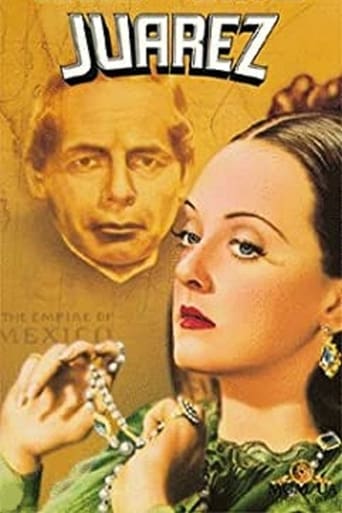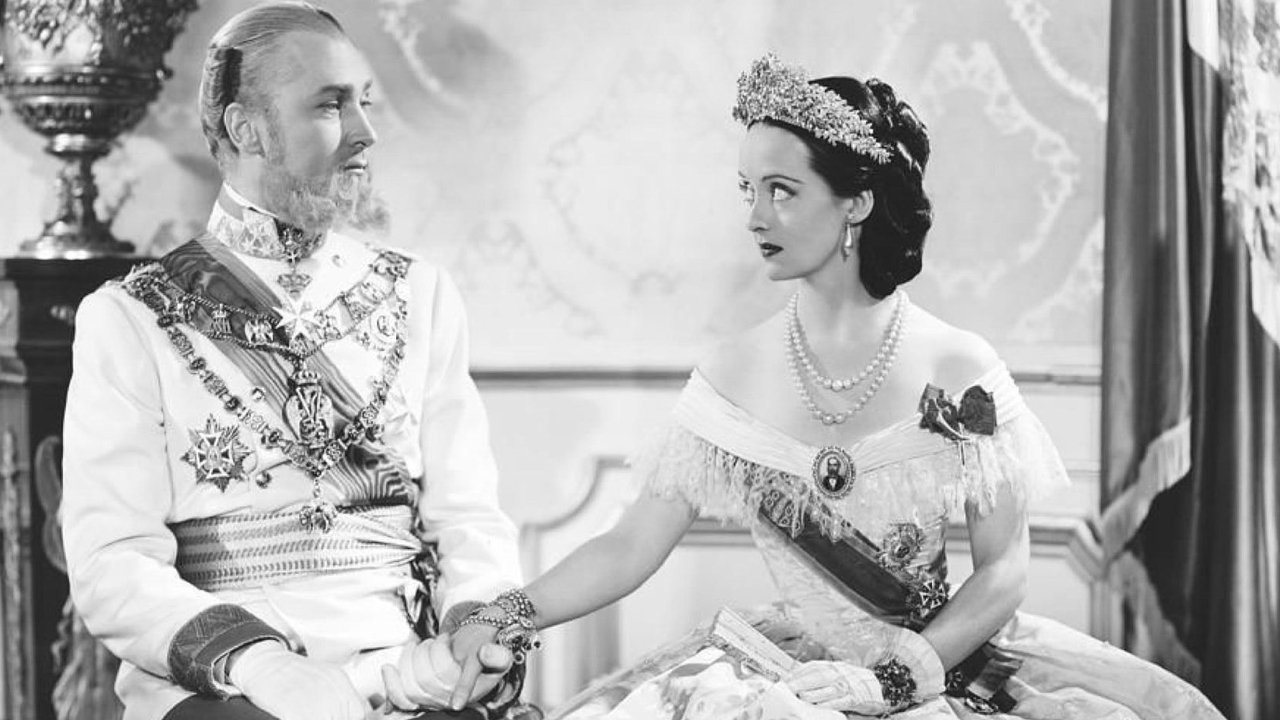Dan-13
I came into this movie mainly to see Bette Davis chew the scenery in her mad scene as the Empress Carlotta, but the film totally belongs to Brian Aherne, who was rightly nominated for an Oscar as Emperor Maximilian. Aherne gives a nuanced and sympathetic portrait of a man thrust into a political situation that he never should have been involved with in the first place. It's a masterful performance, particularly in his final scenes when he's imprisoned. He's absolutely heartbreaking.While physically Davis may not have been ideal as Carlotta, her descent into madness doesn't disappoint and she also excellent in her more tender moments with Aherne.Claude Rains and Gale Sondergaard also contribute wonderfully nasty portrayals of Louis Napoleon and Empress Eugenie.On the minus side, there's Paul Muni, whose stoic expression doesn't change a whit over the course of more than two hours. John Garfield, normally a dynamic actor, is woefully miscast as a Mexican rebel.The movie is well-made, but the title is a misnomer. Maximilian's story is far more interesting than that of Juarez.
Neil Doyle
Warner Bros. obviously spared no expense to do justice to a story of JUAREZ (PAUL MUNI) but spent so much time on the ill-fated reign of Emperor Maximilian (BRIAN AHERNE and his wife Carlotta, BETTE DAVIS), that the film might just as well have been called MAXIMILIAN. An even better title comes from a play on which this is based, called THE PHANTOM EMPEROR.Brian Aherne has the most screen time in what appears to be the central role.Ironically, he was nominated for an Oscar in the "Best Supporting Role" category. If billing in Hollywood was fair, instead of governed by studio politics, he should have shared star billing with Paul Muni and Bette Davis in the opening credits.Having said all that, the details of the story have been given in expert fashion by many of the other commentators who are better acquainted with Mexican history than I am, so I can't talk about the accuracy or inaccuracies of the plot. But from a standpoint of entertainment, JUAREZ attempts to do too much in dealing with a complex plot. The talky script full of historical references becomes tedious and the film occasionally drags and loses momentum until an action scene relieves it of monotony. However, the ability of the writers to cover so much ground in the course of little more than two hours is an achievement in itself.The acting is splendid for the most part--but unfortunately Muni has chosen to play Benito Juarez in almost mute fashion, his stoic expression hardly ever changing and relying on heavy make-up to do the job for him. It doesn't work.But all those around him can only be congratulated for doing well in roles large and small. Davis is especially compelling in Empress Carlotta's scene of incipient madness; Aherne gives dignity and sympathy to Maximilian; and Claude Rains, Gale Sondergaard, Donald Crisp, Gilbert Roland, Joseph Calleia and Montagu Love are excellent in support.The only casting misfire is JOHN GARFIELD in swarthy Mexican make-up as Gen. Diaz. He looks out of place even though he attempts to give an earnest performance and his lower New York accent is just below his Mexican one.Except for a majestic main theme that is used once in awhile, Erich Wolfgang Korngold's overall score did not make a strong impression on me this time.
timothymcclenaghan
The plot of this film devotes more time to the character of Emperor Maximilian than it does the title character of Juarez. There is no development of the character of Juarezwho he was, where he came from, or how he got to the point where the plot begins.It seems as if this film was planned as an all-star vehicle, ensemble cast, somewhat like more modern films such as "Airport", "Towering Inferno" and "Poseidon Adventure". All members of the cast are reputable, capable well-known actors, each of whom has little tidbits of plot throughout the film.Some other reviewers have said that certain actors were miscast in their roles, but since each part is so small, does it really matter? As for other remarks about the omission of Latino actors in this film, that is incorrect as there were several, most notably Gilbert Roland. Check the IMDb complete cast listing and see for yourself. Keep in mind that the story mostly concerns characters of European descent, so you wouldn't be seeing the typical Mexican in the main roles. As for the comments about the lack of battle scenes, the plot is about intrigue, not the war.I think viewing this movie is a worthwhile expenditure of time, just to see so many good actors in one film.
L. Denis Brown
This film is a historical drama in which commendable care has been taken to ensure that the historical record is reasonably accurate. In the mid nineteenth century France had troops stationed in Mexico supporting the French settlers and Mexican conservatives who had jointly forced the indigenous President Juarez out of Mexico City after he carried out land reforms that they opposed bitterly. These troops infringed the Monroe doctrine and Napoleon III knew that once the American Civil War was over they would be forced to leave. He attempted to retain French influence by persuading the Mexican conservatives to call upon a member of the Hapsburg Royal family, the liberal minded Ferdinand Maximilian, brother of Emperor Franz Josef of Austria, to accept the throne of Mexico. The story has all the marks of high tragedy. After his marriage to Princess Charlotte the daughter of King Leopold of Belgium, Maximilian had been appointed as Viceroy of the Lombardo Venetian kingdom in Italy, but he was quickly dismissed from this position by Franz Josef who regarded his policies as too liberal. When offered the throne by Mexican monarchists he would not accept at first, but was eventually persuaded to do so by Napoleon, who promised French support if necessary. He reached Mexico in 1864 to find the massive popular support for a Hapsburg monarch, of which he had been assured, did not exist; and the regime relied upon French troops to remain in power. Although Juarez refused him allegiance, Maximilian decided to back the land reforms and other liberal policies Juarez had introduced, thereby seriously antagonising most of his monarchist Mexican supporters and leaving himself very isolated. Around 1865, when the American civil war ended, the U.S.A. started to supply arms to the Mexican revolutionaries and to exert pressure on Napoleon to remove French troops from North America in accordance with the Monroe doctrine. It quickly became clear that Maximilian's position was unsustainable. Napoleon withdrew French troops and urged Maximilian to leave Mexico. He refused to desert his Mexican supporters, and sent Charlotte back to Europe where she made several attempts to obtain assistance for her husband. When these failed she experienced severe emotional disturbances, and publicly accused her family of betraying her husband until they had her declared insane in order to control her. Ultimately Maximilian was captured by the revolutionaries and, after Juarez himself had refused clemency, executed. Charlotte spent the next 60 years in seclusion in various homes eventually dying in Belgium in 1927. A small point of historic interest is that in the Hapsburg family, which was never noted for its progressive views, both Franz-Josef's brother and his son appear to have been natural liberals. (See my review of 'Vizi Privati, Pubbliche Virtu') Could this have been a reaction to close family contact with the ultra-traditional Franz Josef himself? Whilst this story clearly provides the basis for a very dramatic film, Hollywood should never have considered making it. Great historical films usually require the viewer to experience some degree of involvement with the story and/or the cast. (Imagine "Das Boot" created by a studio outside Germany or "The Battle of Britain" by one outside the U.K.) The situation here was made worse by the selection of Bette Davis to play the part of Charlotte (or in Mexican, Carlota). Bette's career was founded on her part in "Of Human Bondage", and she built it on very strong acting, which often appears as overacting. In this case she plays Charlotte as becoming totally insane at a very early stage, which is widely regarded as incorrect. The acting on the Mexican side is no better. Hollywood chose Paul Muni to play the part of Juarez, and he was so far out of his depth that he acted it largely as a sullen, uncommunicative, and not very intelligent lower class native Mexican; which makes nonsense of the charisma that Juarez displayed to his contemporaries. There is a solid performance by Brian Aherne as Maximilian, and there are some fine sequences showing the court of Napoleon III, but Hollywood quickly becomes out of its depth when depicting nineteenth century Mexico, and viewers of this film never really become involved with its characters in the way that is necessary to create a powerful drama. My recommendation is that if you are interested in this short but dramatic interlude in world history you should read about it in a good encyclopaedia, rather than watch this Hollywood version of the events. I had never seen it until it was shown on the TCN TV channel recently, and as Bette Davis was featured in it I decided to watch. I found it overlong and a little tedious even though I am quite interested in Mexican history. In my view this was no more than a marginally competent film, which was probably not worth bringing back into regular circulation. I would prefer to wait until an equivalent film is created in a Mexican studio by a Mexican cast and crew, and with a Director such as Alfonso Cuaron who has shown proved ability to display fine nuances of character on the screen..



 AD
AD




